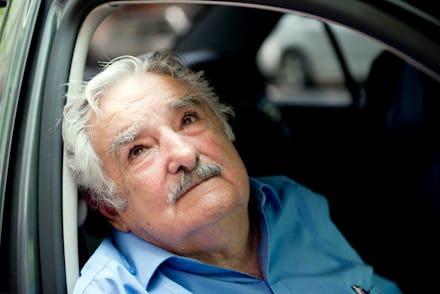How the World's Poorest President Became the Most Popular Public Figure on the Internet

The online world can't seem to get enough of Uruguay's president, José "Pepe" Mujica, the guerilla-turned-head of state who seems to actively tackle the issues that young Americans care the most about: climate change, economic inequality, marijuana legalization and gay rights.
And he does it all while donning a humble uniform of sandals and simple clothes.
Image Credit: AP
Mujica donates his presidential salary to charity and opts to get around in a VW Beetle, earning himself the title of "World's Poorest President."
But as we all revel in how unbelievably self-effacing Uruguay's president is, a part of us may also feel a little sad. Remember when we had the world's coolest president? He was the one who had those neat posters, whose speeches became fodder for will.i.am music videos and who received a Nobel Peace Prize, because many Americans (and perhaps others around the world) had hope that things would change, that a U.S. led by Barack Obama would bring common-sense solutions and tackle the problems that actually matter.
Maybe that's where our obsession with Mujica comes from: He's actually just a sandal-clad Rorschach test for young, jaded liberals. Uruguay legalized both gay marriage and recreational marijuana use last year, both battles still being fought in the United States.
But it doesn't stop there. From 2010 to 2013, the United States passed more restrictions on reproductive rights than over the entire previous decade. Uruguay, during that timeframe, adopted the most liberal abortion law in Latin America.
Here, income inequality is going up. In Uruguay, it's going down.
The United States still operates a prison on foreign soil that contradicts everything we stand for as a nation, even though a certain U.S. president promised us six years ago that it would go away. Mujica, who knows a thing or two about inhumane imprisonment, has offered to take in six detainees from what he calls the "well of shame" in Guantánamo Bay. You half expect Uruguay to pass comprehensive immigration reform next, just to really rub it in our face.
Image Credit: AP
But even in light of all its progressive accomplishments, it is hard to seriously consider Uruguay as some sort of model for the United States to emulate. This is a country, after all, the size of Missouri, with half the Show Me State's population.
Moreover, we tend to gloss over some of the details coming out of Uruguay. The marijuana legalization bill, for instance, prohibits foreigners from smoking, establishes a state monopoly on production and sale of the drug, bans advertising, requires users to register themselves with the federal governments, caps the amount that people can buy per month, and — get this — scans their fingerprints at the checkout counter when they purchase weed. It seems unlikely that Americans would be particularly thrilled about their own government being so involved in their drug habits, or that this brand of reform would jive with our zeal for private enterprise and corporate free speech.
Image Credit: AP
But it's not the specifics that matter here, it's the idea. Uruguay is the parallel universe where our dreams come true. We do the same thing with other countries. They have better health care in Canada! The French don't have to read their work emails if they don't want! But perhaps we just know too much about those other places to get overly excited. U.S. environmentalists aren't exactly enthused by the Canadian oil that would flow through proposed Keystone pipeline. Think youth unemployment is bad here? Check out France's.
Uruguay, however, is a blank slate. Who had ever read a news story about Uruguay before last year? The government there seems to take inequality and human rights a bit more seriously than ours. But really, all we know about Uruguay is that the president is quirky, the pot is legal and the gays can marry. And at the end of the day, that's maybe all we want to know.